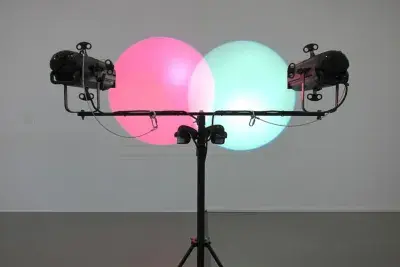Installation view, Amalia Pica, at MIT List Visual Arts Center, 2014
Film (1965), Land of Silence and Darkness (1971)
In her work Amalia Pica confronts the failures, gaps, and slippages of communication. The act of delivering a verbal or non verbal message, and the various forms of communicative exchange that may take place along with the very limits of language, are central to her work. In conjunction with the exhibition the List Center presents a special film program featuring Film, Samuel Beckett’s only work written for film, and Land of Silence and Darkness, Werner Herzog’s critically acclaimed documentary about the world of the deaf-blind.
Film (screenplay, Samuel Beckett; dir., Alan Schneider, 1965, 20 min.)
Nobel Prize-winning playwright Samuel Beckett’s lone work for projected cinema was entitled archetypally, Film, and was inspired by George Berkley’s philosophical pronouncement, essi et percipi: “To be is to be perceived.” In one of his last film appearances Buster Keaton is cast as the object of observation by an all-seeing eye. Filmdocuments the chase between camera and pursued image raising questions about the nature of recorded and projected images. Commissioned and produced by Grove Press’s Barney Rosset, Film features the cinematography of Academy Award-winner Boris Kaufman, whose brothers Dziga Vertov and Mikhail Kaufman created Man with a Movie Camera. The screenplay was written in 1963 and filmed in New York in the summer of 1964. For the shooting, Samuel Beckett made his only trip to America. Film has been awarded numerous prizes including the Film Critics Prize at the 1965 Venice Film Festival, The Special Jury Prize at the 1996 Tours (France) Festival, and the Special Prize at the Oberhausen (Germany) Festival in 1966.
Land of Silence and Darkness (dir., Werner Herzog, 1971, 85 min.)
In this documentary about the world of the deaf-blind, acclaimed director Werner Herzog (Signs of Life, Aguirre: The Wrath of God) explores the life of Fini Straubinger, who was blind and deaf since her late teens and confined to her bed by her mother for three decades before fighting to overcome her isolation. Herzog’s film presents a remarkable portrait of this kind-hearted 56-year-old deaf and blind woman who has dedicated her life to helping the similarly afflicted. In the film Herzog explicitly details both Straubinger’s work and the people she engages with in the deaf-blind community-presenting scenes of people who encounter a daily struggle against the confines nature has imposed on them.
